Is a big fat “TO BE CONTINUED…” too much to ask? I wish I’d known this week’s Star Trek: Discovery episode was the first part of a two-part season finale. It would have lent the insufficient events that pass within its hour a greater sense of occasion.
But alas, Star Trek: Discovery is an important show people watch on the Internet, which means we must at least go through the motions of serialization. That means no “TO BE CONTINUED….”
Forget that nobody seems the worse for wear from last week’s time loop. Or that nobody talks about the super-rare space whales beached in the shuttle bay. Or that Ripper the tardigrade quietly dropped out of conversations about how the spore drive works over the last three episodes.
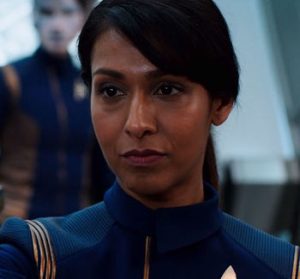
I hope if the ship ever gets hijacked, and if the security systems I set up become a key plot point, people appreciate my work!
Has anyone told Sarek what happened to his diplomatic mission when he couldn’t go? Does anyone even remember the recently dead security chief? Why doesn’t Cadet Tilly remember that interfacing with the spore drive has always afflicted Lieutenant Stamets with a variety of severe psychological side effects?
I’ll face the fact that it’s an episodic show, but episodic shows don’t get to burn one to “move chess pieces.” When the story treads water half the time and ends on a cliffhanger, I want my “TO BE CONTINUED…”
But I don’t get that. Instead, for scaffolding keeping this incomplete construction in place, we get The War.
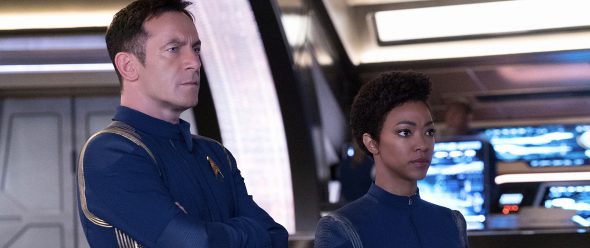
Intense people being formal and courteous in dire circumstances.
The War and the Pahvo
The Klingon-Federation War is supposed to link up this week’s away mission to next week’s confrontations and give it all some stakes. And that’s the problem, for several reasons, because in The War:
- There are no stakes, as we know more or less how The War ends from other Star Trek stuff.
- There are no stakes, as in the end, if The War changes, it will be for business and not story reasons.
- There are no stakes, as the events that happen in the story related to The War aren’t logically connected with each other and don’t appear to be affecting its outcome.
For example, the Klingons have gone through a coup and an internal purge/civil war, which featured heavily in the events of this episode. The factions that originally favored infighting rather than conflict with the Federation have seized control. This seems to have not affected the larger war in the slightest.
And at this point, I don’t care. As a galacto-political event, the war between the Klingons and the Federation is not interesting. How it started was interesting. How it progresses, and how it might end, are not.
That is fine. The show is about the characters, not about the war. War is too big for any one person to see all of it anyway. This is about the perspective of these people, on this ship, and their hopes, dreams, personal growth, relationships, arguments, laser-fights, loves and losses.
And right on cue, to remind us that war is absurd and friendship is what matters, this week we get the Pahvo. The Pahvo are a familiar sort of sci-fi villain: principled but socially incompetent mind-controllers, who turn friends against each other in the interest of the greater good.
True to form and precedent, the Pahvo come with beautiful visual depiction and sinister musical underscoring. The main thing that separates this episode’s away team plot from various episodes across a dozen other sci-fi shows is that Saru’s eyes are already a freaky color and didn’t have to change hue.
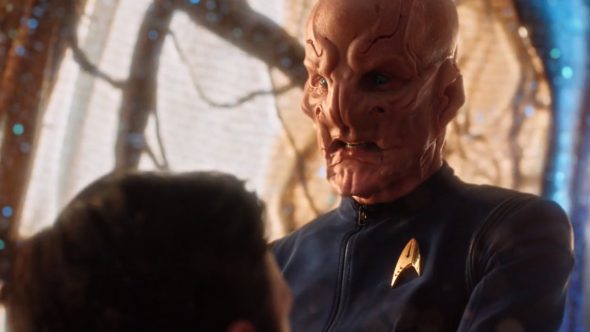
It’s like that time in Buffy the Vampire Slayer where that one person was acting weird and nobody took it seriously enough at first. You know, that one.
But the episode provides no resolution for the Pahvo or their power, because it is, as we have mentioned, the first part of a stealth two-part season finale.
That then leaves us, for now, with what this all means to the characters. And for me, that digs into the heart of my relationship with Star Trek: Discovery.
Don’t Tell Me You Care, Show Me You Care
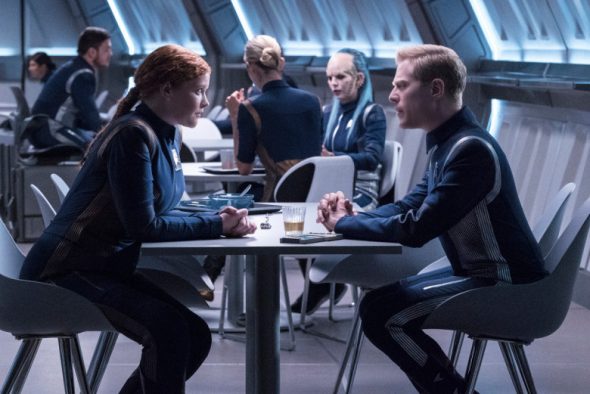
Just look how everyone’s backs are the same angle as each other, and the same angle as the support struts holding up the side of the ship! The people are the architecture of Starfleet.
I am having real trouble connecting with the characters on this show on an emotional level, and that is a pretty rare problem for me. It’s not because of the diversity of populations they represent, or whether or not they are “relatable,” even the ones who superficially look and act like me don’t engender much feeling. It’s not because they do bad things: my expectations for TV and movies these days are really grim and dark, and I’ve never been one to find a crime or sin as enough reason by itself to not connect with or even like a character (Heck, I loved The Shield).
And it’s not like their situations aren’t the sort of situations that would generally be sympathetic under most circumstances. Or that they don’t have enough backstory or character development. They have all these things. It sticks out particularly boldly in this episode, where without much meaningful story happening, sympathetic situations, backstory and character development are all they have.
It’s just, when I look at an actor’s face emoting and reacting, I’m used to feeling something, and on DISCO, most of the time I feel nothing. And that’s strange for me and Star Trek.
I get that DISCO and all Trek is melodramatic. It’s supposed to provoke emotion. The music, the lives at stake, the unity of moral and practical problems, the need for someone to do something… I’ve been rewatching Voyager alongside DISCO, and the influence of Kate Mulgrew’s soap opera experience as she plays Captain Janeway can’t be missed. It’s in her eyes, it’s in the way she turns her head, it’s in the tembre of her voice, her sensitivity and her steel.
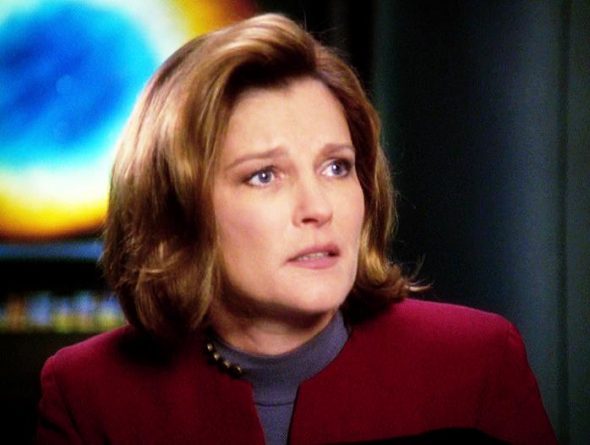
And she’s far from the only one who brings in that kind of style, on that show or on all the other Trek shows. Yes, Trek has that Mr. Spock legacy of competence and rationality and solving problems in a campy exotic way, but it also has the Captain Kirk legacy of passion and emotional intensity, demonstrated onscreen in front of everybody.
Looking at the facial expressions in this episode of DISCO, all the great big eyes as people look at things, if only for a moment. This show wants to be taken as melodramatic. It has all the pieces to function that way. All the relationships, all the conversations about lake houses.
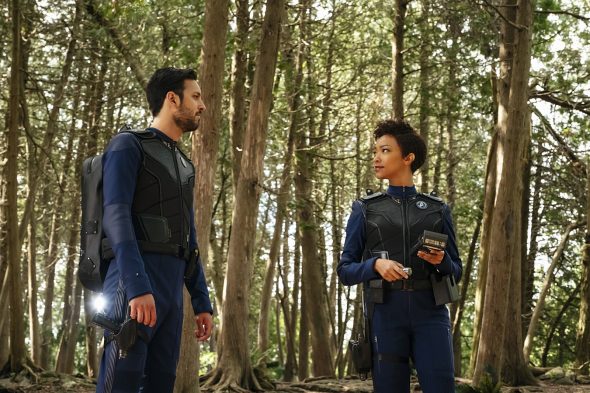
There is a lot of romance and sexual tension in this scene. You can tell from the words they are saying.
I feel like the performances on Discovery are too continent for me. There’s not enough emotion released through everyone’s measured behavior and mannerism, everyone’s stateliness. There’s self control that very little gets through. It’s too formal. And it’s so widespread across so many different players that it’s got to be baked into how it’s shot and edited and the overall creative vision for the show, not any one performance.
Once I started looking for it, I was shocked to see how little anybody’s face betrayed any real loss of emotional control. People had feelings, but they didn’t release them. Characters were able to have calm and rational conversations in absurd situations, by virtue of self control and composure. And it didn’t vary much character to character or situation to situation, not by age, not by species, not by much of anything.
For all the talk of how morally elevated Starfleet tends to be, how much they are starched shirts who always do the right thing and are rational above all else (which of course they are not, but let’s for a minute cleave to the popular narrative Star Trek stories are actually all about people who always behave well and that I didn’t just watch a Voyager episode where Kes went into a fit of estris-enduced pica and started eating dirt, houseplants, and handfuls of bugs before demanding Neelix get her pregnant), Star Trek performances tend to lift feelings to the surface in a big way, even when they don’t provoke undue action.
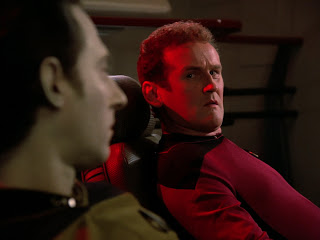 Miles O’Brien in Deep Space Nine (and to a lesser extent TNG) rarely does much that’s really wrong, but he frequently looks distressed. And not just like he is looking at something that makes him sad or scared, but that it’s affecting him, shaking him up, briefly distracting him from what he needs to do. Patrick Stewart is of course a master of maintaining a high style and a commanding, purposeful attitude, but he also colors it with a ton of subtext, and at times reverberates it with powerful excess of outrage, tenderness, joy, or other sorts of informal feeling.
Miles O’Brien in Deep Space Nine (and to a lesser extent TNG) rarely does much that’s really wrong, but he frequently looks distressed. And not just like he is looking at something that makes him sad or scared, but that it’s affecting him, shaking him up, briefly distracting him from what he needs to do. Patrick Stewart is of course a master of maintaining a high style and a commanding, purposeful attitude, but he also colors it with a ton of subtext, and at times reverberates it with powerful excess of outrage, tenderness, joy, or other sorts of informal feeling.
Avery Brooks as Sisko has more sincere feeling coming through in his face and his voice about baseball than anybody in DISCO has about anything. Not that they don’t have reason for feeling, or occasion for it, but they’re all wound up really tight and don’t relax and let it out.
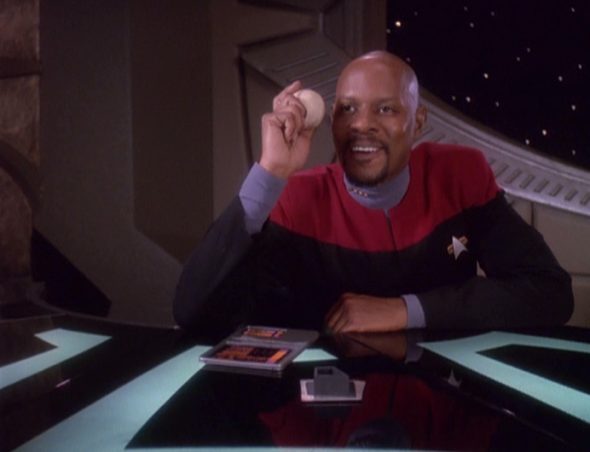
Here are the situation from the latest episode of DISCO where we saw people whose immediate reaction to an extreme piece of information was to never lose their composure, never betray an emotion that shook them up. They might have expressed a little skepticism, a brief note of pause, but everything was kept prim and formal and composed, as if it were another day at the office. Continent.
- Admiral’s torturer offers to defect to the Federation
- Ash realizes that Saru, who is possessed by an alien, knows he is being lied to and is likely to kill him.
- Tilly believes she has been told a vision from the future that her greatest dream in the world is guaranteed to come true, and also that one of her friends who told it to her might be severely mentally damaged.
- Michael Burnham hears from Saru that his murderous rage against her was actually something he wanted and felt good about at the time, rather than something outside his control.
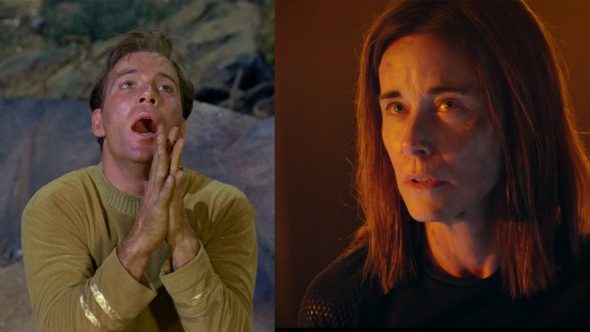
One of these people is in real trouble.
These are people who, even in dramatic situations, behave themselves – as if they are being judged socially by their reactions. These are also people who tend to be very comfortable with keeping their emotions from showing – even when they look upset or happy, it feels like there’s barrier of formality in the performance that I haven’t experienced in other Treks.
Even the bridge crew reaction when the Gagarin is destroyed, which is called out as a likely occasion for (undesirable) emotional reactions, is really quite tightly controlled.
There are two factors that make this especially relevant to what the show is about:
- The main protagonist was trained as a Vulcan, and it is a core part of her character development that she doesn’t show emotion too much. So it is quite possibly a feature, not a bug, and I wish the show did a bit more in the way of contrast to show people who are not like that (and Tilly is a huge failure if that’s what she’s supposed to be – just being cutesy or awkward is not the same as being expressive).
- It was stated throughout the episode by various people that the need to win the war superceded the need to have feelings. Which makes sense, but also puts The War at the center of things, and as we’ve discussed, in this story, it doesn’t really belong in the center of things. (With all this buildup, I’m curious if maybe we’ll finally see some of the feelings release a bit more next week.)
Maybe more than anything else it’s the way the characters in DISCO comfortably suppress their feelings and keep them under control – even as they talk about the reasons they have them – that keeps me from connecting with them, feeling what they feel, and feeling anything in reaction to them.
And also it undercuts Saru’s lament, that he never felt free of fear before. It’s not like you could ever tell, more than a half-dozen times, that he was scared. And an inhuman level of emotional repression is so normal among this group of people that instead of coming off as a sympathetic confession that he was internally a different person than externally, it comes off as kind of a moral failure that he talked about it.
When I looked in Michael Burnham’s eyes at the end of tonight’s episode, this is what I wanted her to be thinking, in my mind’s eye: “You aren’t able to live with your underlying emotions, Saru? Millions of people across hundreds of planets are dead due to my own personal mistakes, and I’m looking at life in prison, and my parents were murdered in a horrible trauma, and I just had a totally horrific psychic mental fight with my dying surrogate father about how he’s a racist who barred me from my dream job like two or three weeks ago, but I eat at the dining hall like nothing happened and you should too just like all of us. And yet, not showing how I feel is so important that it is beneath me to even mention any of this, and I hope you stop embarrassing yourself and figure it out on your own time.”
Well, I’d want to see some sign of that or at least a “TO BE CONTINUED…” sign.
Lore Check
For those who know their imaginary history, this would not be the first Klingon-Federation war to be rendered pointless by deus ex machina. The next one in chronological order, in the era of TV Shatner, will stop before it gets rolling, called off by a mysterious alien race called the Organians.
The Federation will think the Organians are a simple race that needs protection from the Klingons, but they will instead reveal themselves to be super-powered incorporeal paternalists with the ability to disable both sides if they do not choose to play nice. That turns out not to be much of a choice. Thanks, Organians.
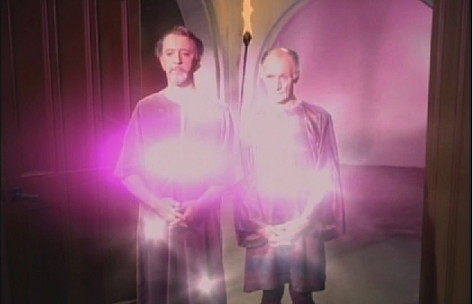
My two magical dads.
The Pahvo seem to waft onscreen as a riff on the Organians, calling both of the sides of the conflict together to attempt to enforce harmony on them by supernatural means. And so, this Klingon-Federation War seems to be headed to a similar reckoning to the one in The Original Series. Whether Pahvo are recognized as benevolent or villainous in the final determination is one point of tension I am actually excited about.
And in not-imaginary history, the title of this episode, “Si vis pacem, para bellum,” means “If you want peace, prepare for war.” It is a platitude by the Roman writer Vegitus from the fifth century: that is, it is from a time when almost all wars by Romans were handled poorly, if at all, and where 200 years of doing little other than preparing for and conducting war had impoverished and dismantled the Western Roman Empire’s economy, infrastructure and social organization, with its final annihilation imminent.
There’s not much reason to believe Vegitus knew much more about war in particular than his contemporaries, especially war done well and executed successfully, or even that he knew much about Roman warfare before his own time, which sucked. But, since his book was the only full military text of its kind to survive the fall of Rome, the things he wrote carry maybe a bit more weight than they might otherwise have. So, sure, appreciate the gravitas of that level of primary source from Late Antiquity, but, in considering Vegitus’s advice, take it with an apocryphal ration of salarium.
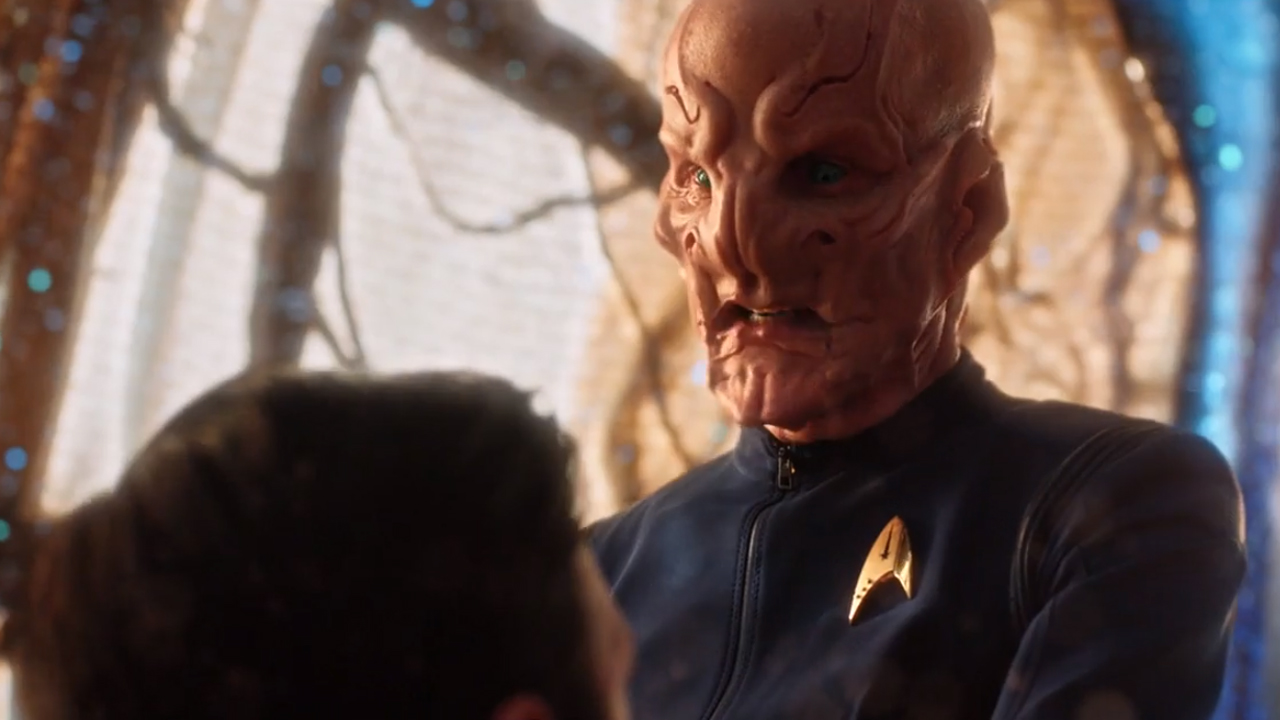
I want to get all defensive about this show now! Like, how much of a problem is “already knowing how the war ended” for Saving Private Ryan? How much time did people spend talking about Tasha Yar the episode after she died? (I haven’t gone back and watched it, but I’m pretty sure the answer is literally none: the episodes were released out-of-sequence, so unless they did reshoots, there couldn’t be any. According to Memory Alpha you can actually see part of her arm in one of the shots!) And once you have penicillin, how much time do you need to spend talking about moldy bread?
But Pete seems to admit that all of this is quibbling. And his more substantive concern — that he doesn’t empathize or sympathize with the characters — is a lot harder to argue with.
Pete, would it be fair to say that your problem with the show is that nobody is chewing the scenery? It seems like that might be the missing special sauce. I wonder what you’d think of the show if there was even just one classically trained actor on board, and they gave him/her a chance to emote and declaim every now and again.
“Pete, would it be fair to say that your problem with the show is that nobody is chewing the scenery? It seems like that might be the missing special sauce.”
We should have learned by now that, when it comes to Star Trek, you KHAAAAAAAAAAAAAAN’t always get what you want.
Sorry folks. I’ll beam myself out of here.
The LINE must be drawn HERE!
When Discovery was announced and everybody was fretting about whether it would be *real* Star Trek, I was saying that as long as they have some amount of Shakespearean, classically trained, scenery chewing, Capital A-Acting, that was all that was required.
:-(
This comment really inspired me, so I wrote a whole follow-up post about it! Not really going into the for/against, but talking about DISCO and Saving Private Ryan. Watch for it on the site soon!
Also, I’ll say that I read the closing conversation with Saru much differently. He wasn’t saying “walking around with all this repression is painful,” he was saying “when I turn my repression off I become violent and aggressive.”
When this episode finished, I actually exclaimed, “it’s over, that was it?” out loud even though I was alone. It really did not feel like enough happened for a whole episode.
So, I’ve been rewatching DS9 along with Diaco (not all of it, been skipping around, but still in order) and I’d like to retract my comment about Star Trek not being about feelings from a couple of weeks ago. Boy is that show about feelings. But, I’ll keep my comment about how this show isn’t good at being about feelings. And I think your comments speak to that. It’s really hard to have a show about feelings if you can’t actually see them.
Sisko has some of the weirdest and oddest line deliveries ever, but they are a way to show his passion and feelings about the war that is happening at that moment (I’ve been focusing on the dominion war episodes to compare it to this show). Lorca who is shown to be mentally imbalanced is a friggin rock compared to him. Even the Klingons are restrained in this show. They’re not constantly drinking and fighting and joking and challenging each other’s honor like they do in DS9. This is a culture where, suppposedly, you ascend by killing your superior officer and two enemies are talking about what’s happening rationally and calmly. Even Odo, whose face is literally blank of expression emotes like crazy (according to Quark, it’s his back and posture that are most expressive).
A couple of weeks ago when I made my comment about feelings it was because it seemed like everyone was annoyed with everyone else. Either that’s the only emoting this show is ok with showing, or, much more likely, the repressed volatile emotions thing the show is actually going for just ends up reading as everyone being cranky.
One more thing i notice in my DS9/Disco comparison: I know people compare Disco to Battlestar Galáctica. But boy is there a lot of that stuff already happening in DS9. I don’t know if Ronald D. Moore had outsized influence in the writers room or if he picked it up then, but it’s definitely all there (especially the stuff about religion, fate and war)
Oh and also, my read of Saru’s actions and admission was to compare it to a drug; it felt so good to be free of fear that he acted insane when faced with the possibility of withdrawal.